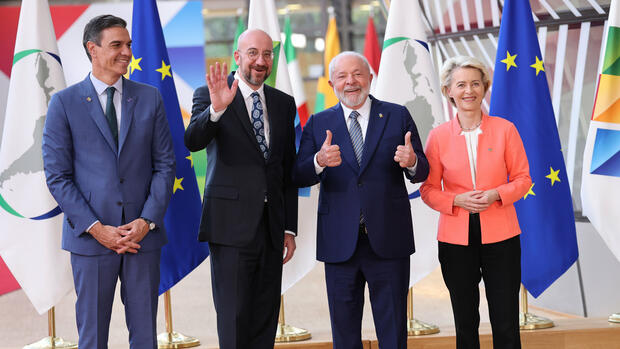In Latin America, the EU is primarily looking for ways out of its dependence on China.
(Photo: AP)
Brussels Luiz Inácio Lula da Silva recently revealed what he thinks of European cuisine on his YouTube channel. The portions he was served at state receptions in Paris and Rome were “tiny,” he complained: “To be honest, I can’t get used to it. I need quantity.”
Measured against such muted expectations, the EU-Latin America summit in Brussels can be considered a great success. At least no complaints reached the outside about the catering of the 50 heads of state and government – the main course was Mechelen chicken with Mediterranean vegetables.
At their first meeting in eight years, the European and Latin American states agreed to strengthen their ties, politically and economically. As part of its Global Gateway infrastructure initiative, the EU promised to invest 45 billion euros in Latin America by 2027 – for example for electric buses in Costa Rica and a new subway line in Colombia. In this way, Europe hopes to curb growing Chinese influence in the region.
In general, China played an important role in the consultations: efforts to reduce economic dependency on the People’s Republic are an important reason for Europe’s increased interest in good relations with Latin America.
The EU agreed on a new raw materials partnership with Chile, which will “contribute to Europe’s security of supply and create jobs in Chile,” as Commission President Ursula von der Leyen said. In order for the green transformation of the European economy to succeed, the EU is urgently dependent on raw materials such as lithium, which have so far been mined in Latin America but processed in China.
No new impetus on Mercosur
This gives the regime in Beijing a lever of power that it can use to put economic pressure on Europe. The agreement with Chile now envisages creating a “strategic supply chain with mutual long-term political and socio-economic benefits”. For example, refineries could be set up in Chile.
Chancellor Olaf Scholz (SPD) in particular repeatedly emphasizes that Europe must regard the Latin Americans as equal partners, not just as suppliers of raw materials. The Chancellor demands that “extractivismo” must be overcome.
However, anyone who had expected new impetus from the two-day summit in the talks on the trade agreement with the Mercosur states of Brazil, Argentina, Uruguay and Paraguay, as originally planned, was disappointed.
Nicaragua blocks criticism of Russia
Even ideological differences could not be completely bridged. Nicaragua has refused to use any strong language to condemn Russia’s attack on Ukraine. The authoritarian country maintains close ties with Moscow. Russia is therefore not mentioned in the summit declaration.
“We are deeply concerned by the ongoing war against Ukraine, which continues to cause untold human suffering and exacerbate existing vulnerabilities in the global economy,” it said instead. From a European point of view, this is at least a partial success, because the consequences of the war are clearly stated.
Scholz emphasized that Russia’s attack on Ukraine is increasingly being perceived in Latin America as an imperial project – not as a reaction to NATO’s restrictions.
The Chancellor therefore spoke of a successful meeting. Von der Leyen even raved about a “new beginning between old friends”. It was agreed in Brussels that they did not want to wait another eight years for the next summit. Gastronomy critic Lula also said goodbye without further complaints.
More: EU-Latin America summit could fail due to questions of detail
